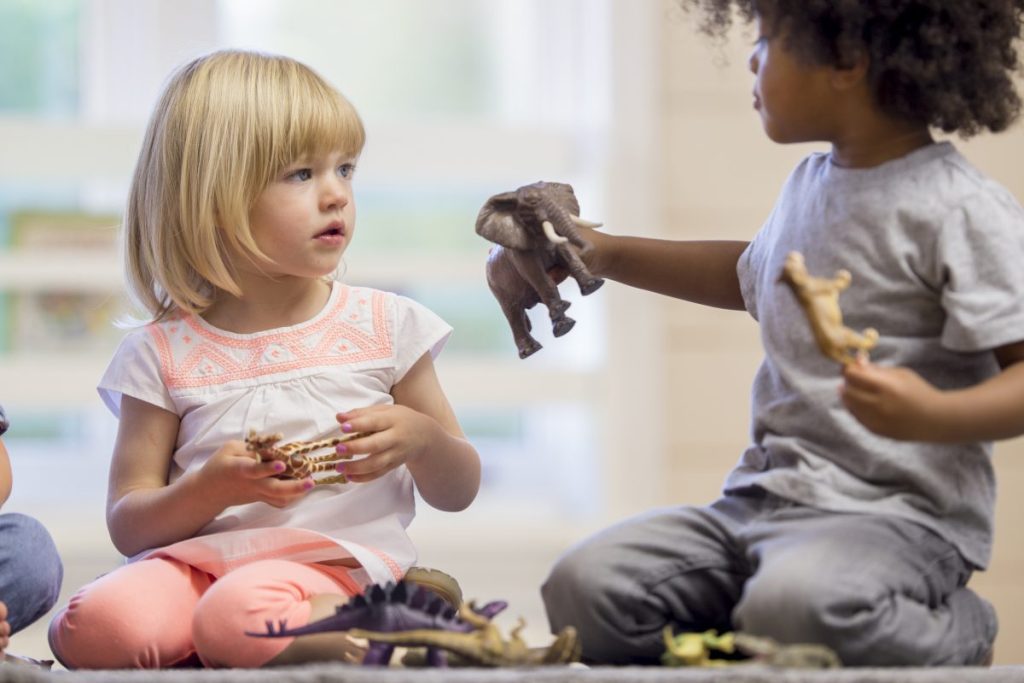
We all say it to ourselves. We see a kid acting like a spoiled brat at the store and think there would be no way our kid would act like that. Well, it’s easier said than done, but if you want to take up the challenge, there are ways to avoid raising a spoiled child and a few red flags to look out for.
Now, we want to say there is a difference between a child being a child and a child being spoiled. Not helping to pay the bills doesn’t make your child spoiled. Screaming in Target like Veruca Salt from Willy Wonka & the Chocolate Factory because they want seven chocolate bars might. Here’s how to keep your child from turning into a spoiled terror.

Basics to keep a child from becoming too rotten
Set your child up to be kind from the start
It’s never too early for your child to learn basic manners. Respect, kindness, and social etiquette are all things to teach your kid as soon as possible so they become a healthy addition to the world. Even if your child doesn’t talk yet, they are always watching and absorbing what’s going on around them.
Once a kid is a bit older and becomes more interactive with people, the parent needs to work with the child on the proper way to behave in all kinds of situations, whether you are at home or not.
Learn to let the emotional releases wash over you
This one is hard. You are in the middle of Target and just told your child, no, they weren’t getting that super-expensive toy. Cue the screaming, rolling-on-the-floor episode. You could either give in, and your child learns how to get you to say yes to everything, or you could learn their behavior is not about you. Show them you’re going to help them get through their emotions — but they aren’t getting the toy.
This one takes a lot of practice, deep breathing, and learning to control your emotions as an adult.
Stop apologizing, and start thanking
Everyone should apply this one in everyday life. Stop telling your child, “I’m sorry,” and start saying, “Thank you.” Amping up the appreciation factor instead of making your child think you owe them for this or that changes the perspective.
Please, apologize when you are wrong or when you made a mistake. But if you’re not getting your child that game or those shoes, that is nothing to be sorry for. Let your child know you are thankful they understand you won’t be buying that right now.
Ditch the materialist things
Most kids become spoiled because they always want stuff. They want a “something,” and get triggered when they don’t get it. We give presents for a birthday and so many holidays that every time a child leaves the house, they think they should get a gift.
We give rewards for potty training, grades, and even reading books (no shade to Pizza Hut). A child gets a prize every time they turn around, so it makes sense when they are told no for once that an overreaction will follow. So, try taking the idea of a “thing” out of it.
Not only will this help your child do something good because we should be good, but it will help your wallet not having to buy your child a treat for everything they do right. Instead, offer an experience or a memory to make in place of an item. Offer your time or offer to let them pick the family movie or the dinner menu for the weekend.
Do as you say, yourself
There is nothing more frustrating than someone telling you to do something they don’t do themselves. If your child sees you getting upset and complaining because they couldn’t do this or get that after you just told them not to complain because they couldn’t, why would they listen to you?
It is sort of annoying having a mini mirror giving you a reality check, but use it to your advantage. Listen to the advice you give your child when they start to act a bit rotten, and put it back on yourself.

Look for these red flags waving in the wind
There are give-away warning signs adults should be able to spot to sound the alarm that a child is learning to be the wrong kind of youngster.
The child cannot be told “no”
If, as a parent, you are scared to tell your kid they can’t have something, that should be a bright red flag you could have a spoiled child.
The child turns everything back to themselves
Getting called out for doing something positive is great. But if your kid hears another child or sibling getting a compliment and says they did that, too, where is their praise, you may need to redirect your child’s energy.
The child is never happy with what they have and always asks for more
If your child has three of the same toy at home but wants a fourth just because they saw it at the store, it’s time to rein it in.
Every parent has a range of what they consider a spoiled child is. But you have to acknowledge the ways your kid could be a bit extra and look out for those bright red alarms in your little humans, if you want to raise children that wouldn’t be the first to go in Willy Wonka’s chocolate factory.



